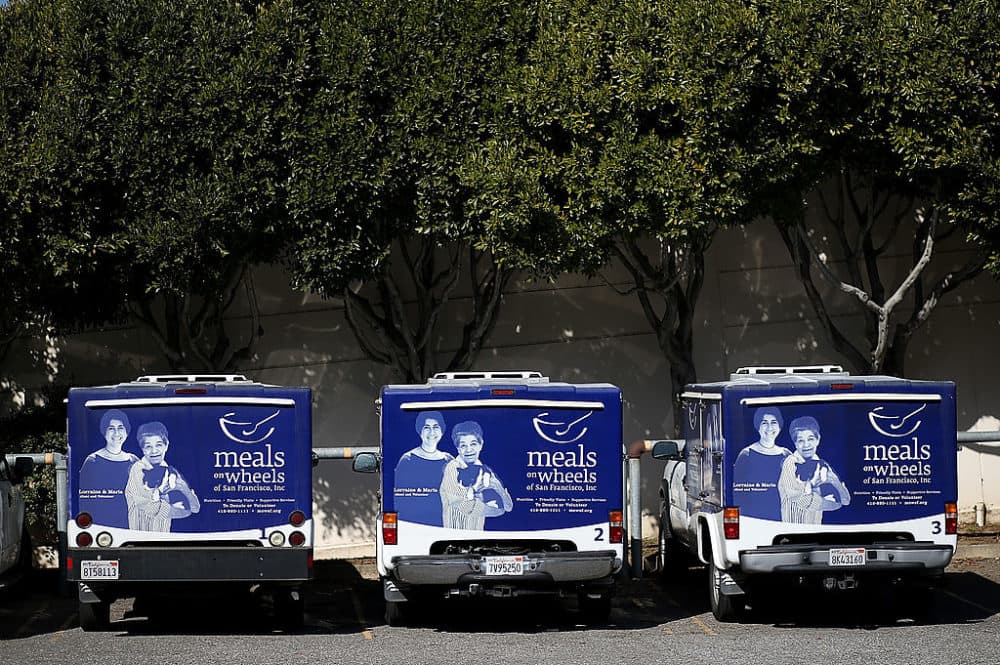Advertisement
View From The Top
Senior Nutrition Programs Get $30M More In Funding Next Year. Meals On Wheels America CEO Says That's Still Not Enough

Tucked away in the $1.4 trillion budget deal that Congress sent to President Trump on Friday is a $30 million increase in funding for a small but noteworthy program: senior nutrition.
The bipartisan deal allocated an additional $15 million to both congregate and home-delivered meals, bringing the total funding for senior nutrition under the Older Americans Act to $936.8 million. But that’s still not enough to meet the needs of more than 9 million seniors at risk of going hungry in the U.S.
Meals on Wheels, the network of local delivery programs that turn those federal dollars into meals, serves some 220 million meals to more than 2 million seniors each year. More than 5,000 independently-run programs operate across the country to bring hot and frozen meals directly to seniors’ doorsteps.
But those programs are serving 21 million fewer seniors than they were in 2005. Adjusting for inflation, nutrition services under the Older Americans Act have actually dropped by 8% over the past 18 years, according to an AARP report.
“We’re delighted to see an increase,” says Meals on Wheels America CEO and President Ellie Hollander, who runs the umbrella organization that tracks and supports the local programs. “We still need more.”
Debbie King directs Waco Meals on Wheels, which covers three rural counties in central Texas.
“Our funding has been the same over the last several years,” King says. “And we are being asked to feed more people.”
The Waco program receives 45% of its funding from Congress, allocated through the state, while the average Meals on Wheels gets 35% of its budget from the federal government. That means programs have to find other ways to fill the gap, often piecing together state and local funds, grants and donations. But senior issues struggle to attract private philanthropy — less than 2% of all foundations, corporations and individuals are giving to seniors and aging-related organizations, according to Hollander.
‘Playing God On A Daily Basis’
Funding shortages force local programs to make tradeoffs. Sometimes that means scaling down meal service from seven days a week to just five, or slashing dessert budgets. Other times, programs are forced to turn away new clients, at least until they can find the money.
“We have mounting waiting lists across the country,” says Hollander. “We have people who aren't even being added to a waiting list because there is no hope that they'll be able to, in their lifetime, get off of one.”
Hollander says about half of the country’s programs have documented waitlists, with waiting times that can last from two weeks to more than a year. Just south of San Francisco, close to 300 seniors are waiting for spots to open up in their local program. In Memphis and northern Florida, the number of seniors waiting has topped 1,000.
Meanwhile in Texas, Waco Meals on Wheels managed to find funding and shrink its waiting list from 180 seniors a year ago to just 35.
Advertisement
But even a short waiting list forces the program to perform a sort of triage.
“Our programs tell us they feel like they're playing God on a daily basis,” Hollander says. “‘Who needs it more than someone else?’ Because if the resources aren't there, what do you do?”
Laura Ziemer, director of client services for the Waco Meals on Wheels, says she wishes her team didn’t have to make those decisions, but they’ve developed criteria that prioritize vulnerable populations. Recent hospital discharges, seniors on hospice and referrals from Adult Protective Services go to the top of the list. The program also prioritizes seniors over 90.
“That means a senior who is homebound but does not have those higher risk factors is kept waiting when they really could also use the meals,” she says. “And the meals might help them from becoming high risk.”
Senior Nutrition Is Preventative Health Care
Meals on Wheels isn’t just meals, Hollander says. It’s preventive healthcare. Research shows home-delivered meal programs ease social isolation and help seniors stay in their homes longer.
“You can actually provide meals to a senior for an entire year for the same cost of being in the hospital for one day or a nursing home for ten,” she says. “For a small investment, we can see significant improvements in health care outcomes and in a reduction in health care costs.”
Meals on Wheels volunteers are the “eyes and ears” of elder care services, Hollander says. Volunteers notice changes in the client’s wellbeing and their physical environment, and they can marshall resources or report issues back to case managers.
King, the director of the Waco program, tells the story of one client who fell in her house, far from a phone, and stayed there until the Meals on Wheels driver arrived the next morning.
Across the country, in central Massachusetts, volunteer Mary Krumsiek heard a senior’s fire alarm going off during a routine drop-off and called the fire chief. On another visit, a door handle broke, locking her inside with a client. She called the senior center and a maintenance worker came out to the house.
“I was so grateful that I was there with him,” she says. “If I weren’t there, I don't think he would've known what to do.”
Krumsiek delivers meals each Wednesday to nearly two dozen seniors in the small town of Millbury. On her visits she sits down at their kitchen tables, chit-chatting about her work in local government or looking at photos of their grandchildren. Like many volunteers, she knows she’s the only person some clients might see that day. And when one dies, she feels the loss.
“When I first started doing it, I’d go to all their wakes and funerals,” she says. “You get attached to them.”
Hollander hopes that kind of connection between senior and volunteer can draw in more philanthropy — and the next generation of volunteers.
“We need to do a better job in our country of demystifying what it means to age,” she says. “When you're knocking on the door, these are folks that have wonderful stories. These are our parents, our grandparents, our teachers, our postal workers.”
Francesca Paris produced and edited this interview for broadcast with Kathleen McKenna. Paris also adapted it for the web.
This segment aired on December 20, 2019.

